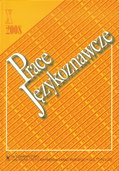Semantyka nocy w pieśniach religijnych
The semantics of the lexeme night in religious songs
Author(s): Monika MaziarzSubject(s): Applied Linguistics
Published by: Wydawnictwo Uniwersytetu Warmińsko-Mazurskiego w Olsztynie
Keywords: cognitive semantics; semantic connotation; religious song; night
Summary/Abstract: This article concentrates on the semantics of the lexeme night attested in the religious songs collected in Śpiewnik kościelny by Father Jan Siedlecki. The paper falls within the scope of research on artistic texts; however, it is special in the sense that religious songs include elements of imagery typical of general Polish. Conventionally, in the metaphorical sense, the night denotes something evil and threatening to a man. This meaning is also confirmed in the material studied in our analysis. However, the textual connotations revealed in the songs were confronted not only with the language facts but also with the conceptualization of the night in the Holy Bible. The meaning of the lexeme night, which is reconstructed in this way, shows both a robust semantic motivation by general Polish and also influences on the cultural level. Thus the negative connotations of the night are made specific as “sin” and “suffering”, and there are also positive meaning components of this lexeme, for instance, “time of God’s action” or “time of prayer”. The textual connotations allow to enrich the semantic structure of the word, then, unveiling its conceptual ambivalence which is hardly discernible in the conventional language use. The analysis also demonstrated that connotational components, both ones in actual use and ones potentially present in language, play a significant role in the overall semantic structure of a word.
Journal: Prace Językoznawcze
- Issue Year: 20/2018
- Issue No: 4
- Page Range: 143-162
- Page Count: 20
- Language: Polish

